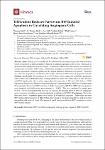Telbivudine Reduces Parvovirus B19-Induced Apoptosis in Circulating Angiogenic Cells
Zobel, Thomas
Bock, C. Thomas
Kühl, Uwe
Rohde, Maria
Lassner, Dirk
Schultheiss, Heinz-Peter
Schmidt-Lucke, Caroline
Aims: Human parvovirus B19 (B19V) infection directly induces apoptosis and modulates CXCR4 expression of infected marrow-derived circulating angiogenic cells (CACs). This leads to dysfunctional endogenous vascular repair. Treatment for B19V-associated disease is restricted to symptomatic treatment. Telbivudine, a thymidine analogue, established in antiviral treatment for chronic hepatitis B, modulates pathways that might influence induction of apoptosis. Therefore, we tested the hypothesis of whether telbivudine influences B19V-induced apoptosis of CAC.
Methods and Results: Pretreatment of two CAC-lines, early outgrowth endothelial progenitor cells (eo-EPC) and endothelial colony-forming cells (ECFC) with telbivudine before in vitro infection with B19V significantly reduced active caspase-3 protein expression (−39% and −40%, both p < 0.005). Expression of Baculoviral Inhibitor of apoptosis Repeat-Containing protein 3 (BIRC3) was significantly downregulated by in vitro B19V infection in ECFC measured by qRT-PCR. BIRC3 downregulation was abrogated with telbivudine pretreatment (p < 0.001). This was confirmed by single gene PCR (p = 0.017) and Western blot analysis. In contrast, the missing effect of B19V on angiogenic gene expression postulates a post-transcriptional modulation of CXCR4.
Conclusions: We for the first time show a treatment approach to reduce B19V-induced apoptosis. Telbivudine reverses B19V-induced dysregulation of BIRC3, thus, intervening in the apoptosis pathway and protecting susceptible cells from cell death. This approach could lead to an effective B19V treatment to reduce B19V-related disease.
Files in this item

